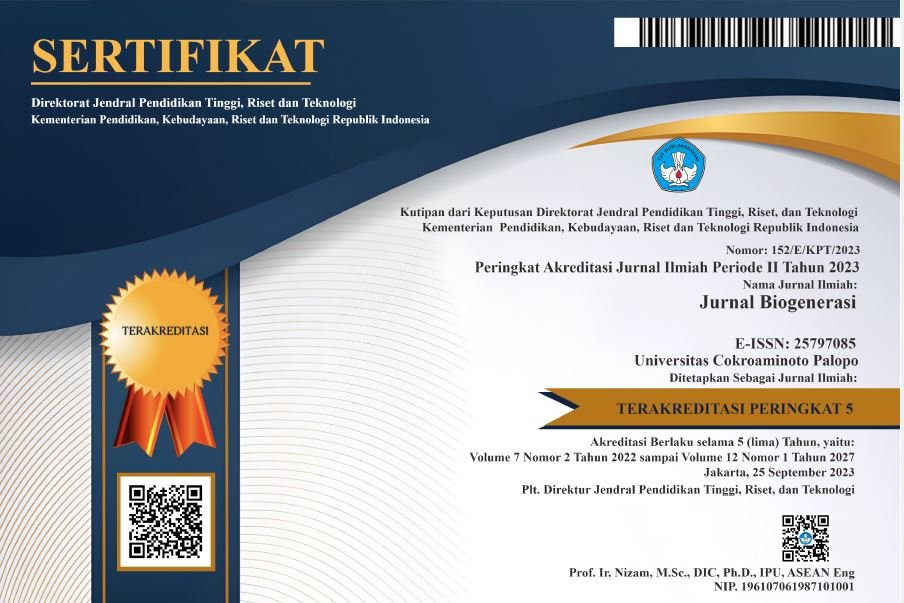EVALUASI PENERAPAN KURIKULUM MERDEKA BELAJAR MENGGUNAKAN MODEL CIPP PADA MATA PELAJARAN BIOLOGI di SMA N 1 TELAGA BIRU
DOI:
https://doi.org/10.30605/biogenerasi.v10i2.6416Keywords:
Biology, CIPP, Curriculum, Evaluation, SMAN 1 Telaga BiruAbstract
This study aimed to evaluate the implementation of the Emancipated Learning Curriculum in the Biology subject at SMA Negeri 1 Telaga Biru using the CIPP (Context, Input, Process, Product) evaluation model. The qualitative study was employed to understand the effectiveness of curriculum implementation. The evaluation of CIPP covered four aspects, encompassing context, input, process, and product. The results of the context aspect indicated that the objectives of the curriculum were in line with the school's vision and mission in shaping students' character, competitiveness, and readiness for future challenges. Then, the input aspect indicated that the readiness of teachers and adequate facilities and infrastructure, but it required improvement in technology and learning resources. In the process aspect, the learning has implemented contextual approach and project-based methods, although active student participation and access to technology were still poor. Meanwhile, the product aspect indicated an increase in learning outcomes, critical thinking skills, and deep and applicable students' conceptual understanding. In general, the Emancipated Learning Curriculum in the Biology subject has been running effectively, although continuous improvement is still needed for more optimal results.
Downloads
References
Angelika, N. & Rusilowati, A., 2025. Evaluasi implementasi Kurikulum Merdeka dalam pembelajaran Biologi melalui model CIPP. Jurnal Penelitian dan Evaluasi Pendidikan Indonesia, 15(1), pp.45–60.
Darmawan, E., Rachman, F. & Sukmawati, I., 2024. Analisis kesulitan guru biologi dalam mengembangkan modul ajar pada Kurikulum Merdeka di Sekolah Penggerak Kabupaten Temanggung. Bioscientist: Jurnal Ilmiah Biologi, 12(1), pp.221–240.
Fadli, S., Supratman, M., Mahyuni, S., Qamarul, U., & Badaruddin, H. 2024. Implementasi Model Evaluasi CIPP Pada Pelaksanaan Pembelajaran Matematika Dalam Program Merdeka Belajar Di Sekolah Dasar. SCIENCE : Jurnal Inovasi Pendidikan Matematika Dan IPA, 4(2).
Fitriani, R. & Wulandari, S., 2022. Peran Integrasi ICT dalam Meningkatkan Keterlibatan dan Komunikasi di Sekolah Menengah. Jurnal Teknologi Pendidikan, 10(1), pp.45–56.
Hidayat, F. & Ramadhan, A., 2023. Implementasi Penilaian Autentik dalam Kurikulum Merdeka: Studi pada Sekolah Menengah. Jurnal Evaluasi Pendidikan, 11(2), pp.98–107.
Juliani, R. et al., 2023. Implementasi pembelajaran diferensiasi berbasis projek dalam mengakselerasi kurikulum merdeka. SELAPARANG: Jurnal Pengabdian Masyarakat Berkemajuan, 7(2), pp.123–135.
Kementerian Pendidikan, Kebudayaan, Riset, dan Teknologi. 2022. Panduan Kurikulum Merdeka. Jakarta: Kemendikbudristek.
Khoirin, N., Yoenanto, N.H., Ainy, N. & Nawangsari, F., 2023. Hambatan dan Solusi dalam Implementasi Kurikulum Merdeka pada Jenjang Sekolah Dasar: Sebuah Kajian Literatur. Jurnal Kependidikan, 12(3).
Miles, M.B., Huberman, A.M. & Saldana, J., 2014. Qualitative Data Analysis. 3rd ed. SAGE Publications Inc.
Nursafinah, S., Aisah, S., & Pricilia, H. 2024. Peran Kurikulum Merdeka Untuk Memajukan Kualitas Pembelajaran di Sekolah. Karimah Tauhid, 3(8), 9050.
Nurwiatin, N., 2022. Pengaruh Pengembangan Kurikulum Merdeka Belajar dan Kesiapan Kepala Sekolah Terhadap Penyesuaian Pembelajaran di Sekolah. EDUSAINTEK: Jurnal Pendidikan, Sains dan Teknologi, 9(2), pp.472–487.
Pertiwi, Y., Indah, R.A. & Fitri, R., 2022. Pemanfaatan Teknologi Informasi dan Komunikasi dalam Pembelajaran Biologi di Sekolah. Prosiding Seminar Nasional Biologi, 2, pp.1–7.
Prasetyo, B. & Nugroho, D., 2023. Implementasi Pembelajaran Berbasis Proyek dan Diferensiasi dalam Kurikulum Merdeka untuk Meningkatkan Interaksi dan Motivasi Siswa. Jurnal Pendidikan Biologi Indonesia, 9(2), pp.112–123.
Relinda, D. 2023. Efektivitas Pelaksanaan Kurikulum Merdeka Belajar. Jurnal Online Universitas Muhammadiyah Surabaya, 195–203.
Stufflebeam, D. S. (2003). The CIPP Model for Evaluation: International Handbook of Educational Evaluation. Kluwer Academic Publishers
Downloads
Published
How to Cite
Issue
Section
License
Copyright (c) 2025 Abubakar Sidik Katili, Rizkiyanto Rusman, Wirnangsi Din Uno, Lilan Dama, Frida Maryati Yusuf, Herinda Mardin

This work is licensed under a Creative Commons Attribution 4.0 International License.
In submitting the manuscript to the journal, the authors certify that:
- They are authorized by their co-authors to enter into these arrangements.
- The work described has not been formally published before, except in the form of an abstract or as part of a published lecture, review, thesis, or overlay journal.
- That it is not under consideration for publication elsewhere,
- That its publication has been approved by all the author(s) and by the responsible authorities – tacitly or explicitly – of the institutes where the work has been carried out.
- They secure the right to reproduce any material that has already been published or copyrighted elsewhere.
- They agree to the following license and copyright agreement.
License and Copyright Agreement
Authors who publish with this journal agree to the following terms:
- Authors retain copyright and grant the journal right of first publication with the work simultaneously licensed under Creative Commons Attribution License (CC BY 4.0) that allows others to share the work with an acknowledgment of the work's authorship and initial publication in this journal.
- Authors are able to enter into separate, additional contractual arrangements for the non-exclusive distribution of the journal's published version of the work (e.g., post it to an institutional repository or publish it in a book), with an acknowledgment of its initial publication in this journal.
- Authors are permitted and encouraged to post their work online (e.g., in institutional repositories or on their website) prior to and during the submission process, as it can lead to productive exchanges, as well as earlier and greater citation of published work.


.png)

